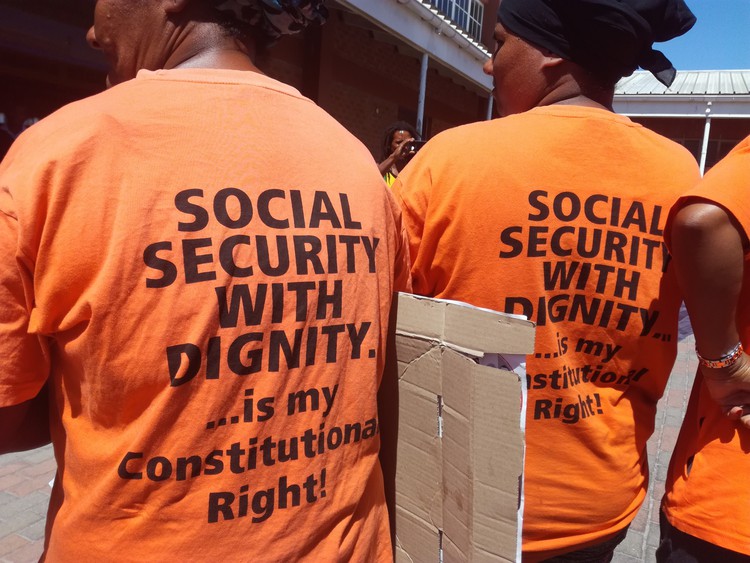
Freedom Under Law says it would be wrong for CPS to profit from its unlawful and invalid contract to pay social grants. Photo: Barbara Maragele
7 March 2017
Civil rights association Freedom Under Law has asked the Constitutional Court to prevent Cash Paymaster Services from making profits from a new grants payment contract with the SA Social Security Agency (SASSA).
In documents to the Court, Freedom Under Law executive officer Nicole Freitz asks for permission to intervene in support of the application filed by the Black Sash last week. The Black Sash, represented by the Centre for Applied Legal Studies has asked the Court to take back from SASSA oversight of grant payments when the current contract with CPS expires on 31 March.
Freitz also asks the Court to prevent CPS from charging more than it is currently charging per beneficiary.
The application rests on rulings by the Court in 2013 and 2014, in which the judges found that the contract SASSA signed with CPS in 2012 was invalid and stated that CPS should not be allowed to benefit from an unlawful contract. The Court ordered CPS to file audited statements of expenses incurred, income received and net profit earned under the contract “within 60 days of the completion of the five-year period for which the contract was initially awarded”. Within 60 days after that, the Court said, SASSA must obtain “an independent audited verification” of the CPS accounts and file this with the Court.
In this week’s papers, Freitz asks the Court to force CPS to disclose all its documentation relating to the new contract as well, and to prevent it from raising the fees charged to SASSA.
“CPS should not be entitled to charge more than it is currently charging under the 2012 contract for the period of the proposed interim contract, otherwise it would unlawfully benefit from the 2012 contract,” says Freitz in her papers.
She also asks the Court to order CPS to file audited statements of income, expenses and profits from the interim contract, and to order SASSA to audit these statements with the approval of the National Treasury.
The process followed in engaging CPS to continue to distribute the grants is “evidently… not in line with the principles set out by this Court,” says Freitz. She says the conduct of Minister of Social Development Bathabile Dlamini and of SASSA is “improper” and that CPS has “failed to appreciate its constitutional obligations”.
She quotes a letter to the National Treasury in which SASSA said the annual fees paid to CPS for distributing the grants could go up by between R838 million and R1.2 billion from the present R2.2 billion.
Freitz says CPS is trying to take advantage of its position to “extract a significant increase”.
“It does not really matter whether or not the proposed interim contract is an extension of the invalid 2012 contract or a new contract. The question is whether it is a consequence of the invalid 2012 contract and the answer has already been provided by the Minister and SASSA – it is.”
Freitz says CPS’s bargaining power comes directly from the invalid 2012 contract and it “should be precluded from deriving the fruit of any such bargaining power”.
“It is evident that even at the current rate of R16.44 per beneficiary, Cash Paymaster has made a profit for some time.
“In those circumstances, for Cash Paymaster to ask, and for SASSA to agree, to pay more than R16.44 for this interim period could never be lawful.”
“Cash Paymaster’s unlawful incumbency cannot be allowed to place it in a position to exact a further R200 million to R1.2 billion of pure profit,” says Freitz.